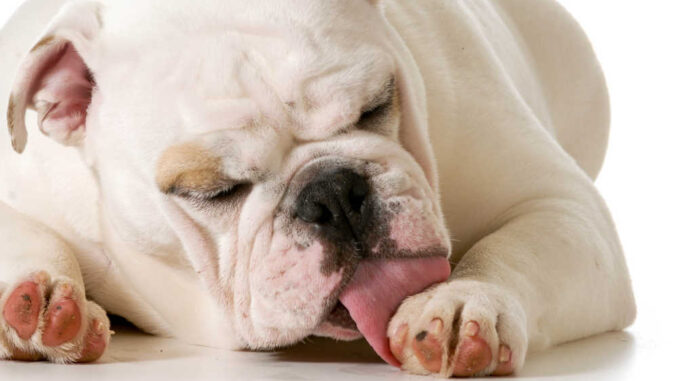
This article was updated on May 9th, 2023
You may notice your dog licking his paws on occasion. This is often just part of his everyday grooming routine; however excessive licking can be a sign of something more serious. Allergies, wounds or injuries, and even thorns or sticks in the skin can all cause excessive licking or chewing. These are all common conditions that your vet probably sees on his or her schedule on a routine basis though, and should be able to make your pup feel better soon.
What causes a dog to lick his paws?
Occasional paw-licking is part of your dog’s normal everyday grooming process. It is normal when not done in excess. Dogs typically do not concentrate their licking on a specific area for more than a minute or so. It is important to note if he is licking more frequently than usual since this can be a sign that something is bothering him.
Quick tip: how to tell if your dog’s excessive paw licking is due to injuries or allergies
Is he focused on licking just one paw or all of them? This gives us some clues as to what might be happening underneath all that hair and skin before we even take a look! For example, if he is concentrating on the same paw every time, there might be a wound or injury in that particular foot.
If he’s licking all of his paws, it is more likely to be allergy-related.
Potential causes of excessive licking
1. Skin infection
Bacteria is a normal finding on the skin of all animals, but an overgrowth of harmful bacteria leads to infections. Frequent licking can often make a bad situation worse. Moisture builds up on the skin and results in bacterial growth. This can be a primary infection or caused by cuts, fragile skin from allergies, or even foreign material stuck in the skin, such as sticks. You may see redness around the area and between the toes and webbing, bleeding, or even some yellowish discharge from the skin.
2. Abscess or foreign material stuck in the skin
Foxtails are a great example of this cause of excessive licking. They are weeds with barbed or pointy clusters at the end that can enter a dog’s skin and track through it. They can cause wounds and draining tracts but are often tricky to find. But anything that can stick in the skin can be a source of irritation – a stick, a rock, even a fishing hook (your vet has probably seen this happen!).
3. Allergies
Allergies are one of the most common reasons your vet sees for paw licking. Environmental allergies routinely affect dogs, especially in the spring and summer. They often have itchy red skin, especially in the ears and on the paws.
Food allergies can also be a culprit. A dog with a food allergy is typically allergic to the protein source, so it is important to pay special attention to what you are feeding your dog. Interestingly, a lot of dogs with severe allergies are allergic to chicken. Even if you stick with the same food brand, changing the protein source (from salmon to chicken for example) may result in your pet displaying symptoms.
4. Injuries or pain
This is a broad category that can include: wounds, a broken nail, and even hot sidewalks causing paw pad issues. Even conditions like arthritis can cause your dog to lick if it is painful. Licking can stimulate areas of the brain that help temporarily numb the area.
5. Stress, anxiety, or boredom
Dogs experiencing boredom or anxiety may develop behavioral tendencies like barking, digging, and paw licking. These habits can be hard to break, but providing your dog with adequate exercise as well as stimulating toys or treats while you are gone can be beneficial.
Veterinarian Tip: The most important part of the treatment plan for a lick granuloma is not allowing the pet to lick the area. Talk to your vet about ways to accomplish this for your dog.
Can paw licking cause health problems?
While paw licking itself is often caused by an underlying problem, continuous licking can make things much worse for your pup! The skin is often already irritated, and licking often delays healing. It can also reopen wounds that are already in the healing process, as well as introduce more harmful bacteria.
Can I stop my dog from licking his paws?
The answer is yes and no! It is essential to determine WHY your dog is licking and try to help remedy that. There are steps we may take in the meantime as physical barriers to help curb the licking.
Physical Barriers
- Booties when walking on hot ground or ice. Don’t forget that frozen ice on the paws and toe webbing can be just as irritating and problematic as a hot sidewalk.
- Cone (Elizabethan or e-collar as your vet may call it) – This is critical for infected areas as it physically prevents the dog from accessing it.
- Cleaning feet after walks – This is important when there have been chemicals applied to the grass, salt on icy roads, or any other known chemicals. You can use a towel and cool water or even unscented baby wipes.
Other Tips and Tricks
- Redirecting his attention to a toy or other stimulus – This is especially useful for behavioral (boredom, anxiety) issues. Puzzle or treat-dispensing toys that take a while for your dog to work through are great options.
- Exercise – long walks, dog parks, social interaction – wear that pup out!
What You Shouldn’t Do!
- DO NOT apply topicals without direction from your veterinarian, even over-the-counter products. While some products may be harmless, others can cause irritation or worsen wounds or inflammation.
- DO NOT wrap or bandage the foot. Bandages that are placed too tight can cause circulation issues. They also get wet easily, creating a moist environment perfect for bacterial growth. Always let a vet or vet tech place a bandage or teach you how to do it.
When should I call the vet?
If your dog seems bothered by his feet or is obsessively focused on licking or chewing them, it is always a good idea to have your veterinarian take a look. This is especially true if there is any bleeding, swelling, discharge, or redness is worsening. It is also a good idea to have it checked if your dog is limping or not putting pressure on a certain foot.
What will the vet do about my dog licking his paws?
Your veterinarian will do a thorough exam of your dog, paying special attention to the feet, nails, paw pads, and the surrounding skin. They are observing things like pain when touching certain areas, any wounds or swellings that might indicate infection, or anything sticking in the skin like a rock or thorn.
Your vet may also ask questions about your dog’s diet and any recent changes, recent exposure to very hot or very cold conditions, or any itching, scratching, or history of allergies. Some conditions may be easily ruled out with just a thorough history. For example, if your dog has been eating the same exact food for years and just started licking one paw, it’s unlikely to be a food allergy. Or if you recently took him on a hike on a hot day, the vet may be looking for blistered paw pads. Always tell your vet about any medications and supplements your dog may be on, as well as any medical conditions that you know of.
Your dog’s specific treatment plan will depend on the cause of licking. For example, if your vet suspects a wound or abscess, they will likely shave the area and clean it. At that point, they can determine if he needs antibiotics or bandages as well. If they suspect an allergy they may recommend an allergy medication or a change in diet.
FAQ
What is My Dog Trying to Warn Me About When He Licks His Paws?
Something is probably bothering him – a wound, irritated skin, or pain are all common.
Can I Put Apple Cider Vinegar on My Dog’s Paws?
Typically it is best to keep wounds or infected areas as clean and dry as possible. It is usually best not to put apple cider vinegar, or any other topical ointments unless directed by your vet. You can help your pup out by keeping the feet clean with cool water, a washcloth, and a mild antibacterial soap. Make sure to dry his feet really well afterward.
Is it True that My Dog’s Saliva Can Kill Bacteria?
Maybe. There are some studies that indicate both male and female dogs’ saliva contains enzymes that kill specific types of bacteria, but it may not be in a significant amount. The problem with allowing dogs to lick wounds is that they often overgroom and cause further trauma to the surrounding skin, thus eliminating any benefits from the saliva.
Related post: Dog Licking Paws & Limping: What Could It Be?
More about paw issues:
 Dog Paw Allergy Issues: 6 Tips to Help Your Dog [With Pictures] - One of my pet parents brought her dog into the clinic because he was furiously licking and chewing on his… [...]
Dog Paw Allergy Issues: 6 Tips to Help Your Dog [With Pictures] - One of my pet parents brought her dog into the clinic because he was furiously licking and chewing on his… [...]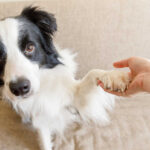 White Bumps on a Dog’s Paw: Most Likely Reasons - If you’ve noticed a new white bump or lump on your dog’s paw you’re probably wondering what’s causing it. White… [...]
White Bumps on a Dog’s Paw: Most Likely Reasons - If you’ve noticed a new white bump or lump on your dog’s paw you’re probably wondering what’s causing it. White… [...]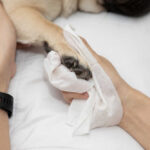 4 Cysts Often Found on Dog Paws [With Pictures & Vet Advice] - Ahh dog feet, giant Great Dane Marmaduke paws, tiny terrier tootsies, the puffy, fluffy white feet of a Bichon Frisé.… [...]
4 Cysts Often Found on Dog Paws [With Pictures & Vet Advice] - Ahh dog feet, giant Great Dane Marmaduke paws, tiny terrier tootsies, the puffy, fluffy white feet of a Bichon Frisé.… [...]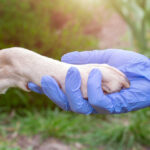 Paw Yeast Infections in Dogs: What They Look Like & What To Do - When most people think of yeast, the first thing to come to mind would probably be a freshly baked loaf… [...]
Paw Yeast Infections in Dogs: What They Look Like & What To Do - When most people think of yeast, the first thing to come to mind would probably be a freshly baked loaf… [...]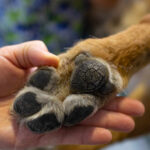 8 Paw Lumps, Bumps & Sores in Dogs [With 16 Pictures] - Seeing skin issues is a nearly everyday thing for us at our veterinary clinic. This article will help you identify… [...]
8 Paw Lumps, Bumps & Sores in Dogs [With 16 Pictures] - Seeing skin issues is a nearly everyday thing for us at our veterinary clinic. This article will help you identify… [...]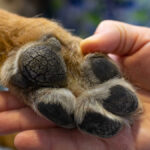 Dog with Cracked Paws? Our Veterinarian Explains What to Do - A dog’s feet often seem indestructible. After all, they’re on the go in all types of terrain, allowing your dog… [...]
Dog with Cracked Paws? Our Veterinarian Explains What to Do - A dog’s feet often seem indestructible. After all, they’re on the go in all types of terrain, allowing your dog… [...]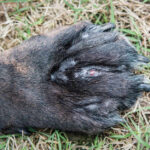 Dog with Swollen Paws [with Pictures] Our Veterinarian Explains What to Do - A dog with swollen paws or paw pads may be suffering from something as simple as a thorn in their… [...]
Dog with Swollen Paws [with Pictures] Our Veterinarian Explains What to Do - A dog with swollen paws or paw pads may be suffering from something as simple as a thorn in their… [...]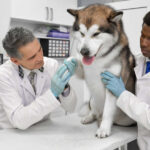 Dog Paw Infections and Issues: Pictures & Vet Advice - Dog paw infections are one of the more common issues that we treat in our veterinary hospital: dogs often excessively… [...]
Dog Paw Infections and Issues: Pictures & Vet Advice - Dog paw infections are one of the more common issues that we treat in our veterinary hospital: dogs often excessively… [...]Disclaimer: This website's content is not a substitute for veterinary care. Always consult with your veterinarian for healthcare decisions. Read More.


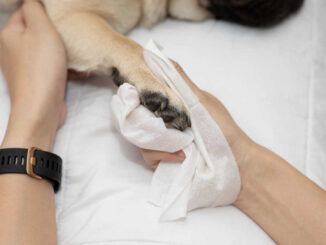
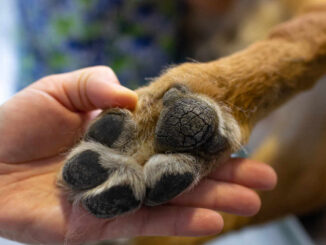

Be the first to comment